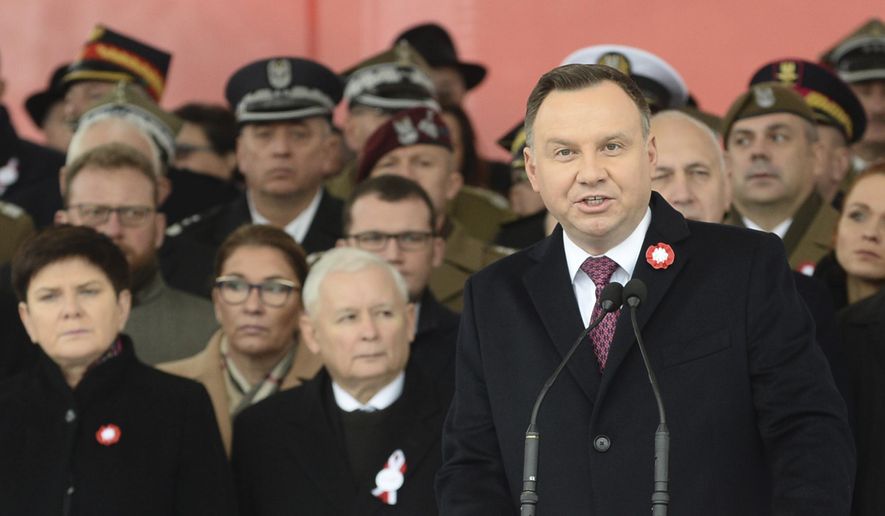WARSAW, Poland (AP) - Poland’s president, prime minister and other top political figures led an Independence Day march Sunday as part of a day of centenary celebrations, trailed by a huge crowd led by nationalist groups.
More than 250,000 people marched in Warsaw to mark the 100th anniversary of Poland’s rebirth as an independent state at the end of World War I, according to police.
President Andrzej Duda, Prime Minister Mateusz Morawiecki and the leader of the conservative ruling party, Jaroslaw Kaczynski, walked in a crowd fronted by soldiers carrying a huge flag words “For You Poland.”
Walking a small distance behind them was another crowd of nationalists and their supporters, many of them burning firecrackers and flares, creating flashes of red light and smoke.
Most in that contingent carried national white-and-red flags, but some held flags of the National Radical Camp, a far-right group and one of the main march organizers. The camp’s flag has a falanga, a far-right symbol dating to the 1930s of a stylized hand with a sword.
There were also a few flags of Forza Nuova, an Italian group whose leader, Roberto Fiore, describes himself as fascist. One of the organizers of the march, Krzysztof Bosak, insisted that Forza Nuova are nationalists who are in touch with the Polish group.
Among the slogans that participants shouted were “USA, empire of evil” and “Poland, white and Catholic.” Members of one nationalist group, eurosceptic All-Polish Youth, burned a European Union flag. An EU flag was also burned at another nationalist rally in Wroclaw. The city’s mayor dissolved the march by nationalists toward its end, during speeches by far-right leaders.
Over the past decade, nationalist organizations have held Independence Day marches in Warsaw on Nov. 11 that have included racist slogans, flares and in some years, acts of aggression.
Sunday’s was by far the largest Independence Day march to date, and it was mostly peaceful. Government spokeswoman Joanna Kopcinska called it “the biggest march of free Poles in a free Poland.”
This year, in honor of the centennial, state officials sought to hold one big government-led march for Sunday’s ceremonies. At first, negotiations broke down over requests for the radical groups to leave banners at home, but an agreement on a joint march was reached on Friday.
“Let this be our joint march, let it be a march for everyone, a march where everyone wants to be and feels good, marching for Poland,” Duda said at the start of the march.
Duda and the government faced criticism from liberal opposition politicians for their willingness to negotiate with nationalists, including some who have made anti-Semitic comments in the past. After some individuals showed up with extremist emblems, the state officials - surrounded by security - appeared to try to keep some distance from the nationalists, marching ahead of them on the same route.
Throughout the day, observances, Masses, marathons and fireworks were held in cities and small towns to commemorate the nation’s statehood regained at the end of World War I, after 123 years of foreign rule.
The national flag fluttered from buildings, buses and cars, while dignitaries and regular citizens placed flowers at memorials to the father of Polish independence, Marshal Jozef Pilsudski. The historic Sigismund Bell, reserved only for the most important national events, rang out over Krakow.
March participant Bartlomiej Mazur, 23, who travelled 320 kilometers (200 miles) to the capital, said he wanted to show that “Poland is a strong, proud nation. We have freedom and we have the right to manifest our feelings and our pride in our country.”
The ceremonies in Poland coincide with world leaders gathering in Paris on Sunday to mark a century since the armistice of what was then called the Great War.




Please read our comment policy before commenting.